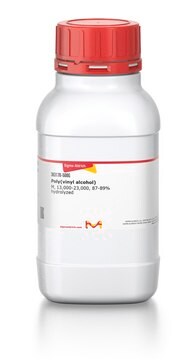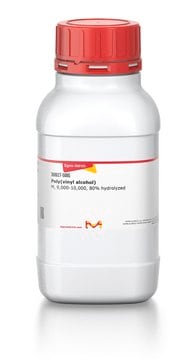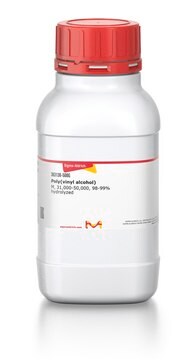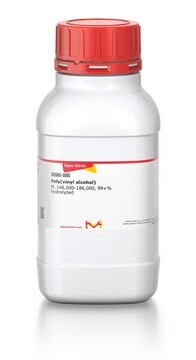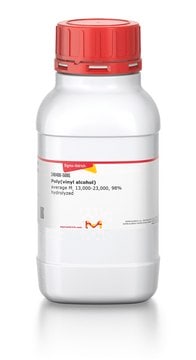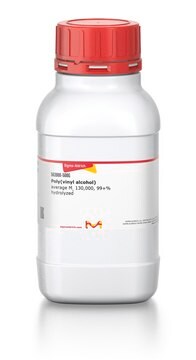P8136
Poly(vinyl alcohol)
87-90% hydrolyzed, average mol wt 30,000-70,000
Synonym(s):
PVA, PVAl, PVOH, Poly(Ethenol)
Sign Into View Organizational & Contract Pricing
All Photos(2)
About This Item
Linear Formula:
[-CH2CHOH-]n
CAS Number:
MDL number:
UNSPSC Code:
12352104
NACRES:
NA.21
Recommended Products
Quality Level
form
powder
mol wt
average mol wt 30,000-70,000
viscosity
4-6 cP, 4 % in H2O(20 °C)(lit.)
solubility
H2O: soluble
InChI
1S/C2H4O/c1-2-3/h2-3H,1H2
InChI key
IMROMDMJAWUWLK-UHFFFAOYSA-N
Looking for similar products? Visit Product Comparison Guide
Application
Poly(vinyl alcohol) has been used:
- in in vitro production (IVP) of bovine embryos
- oocyte recovery and in vitro maturation
- as a macromolecular component in basal cultured medium
Biochem/physiol Actions
Poly(vinyl alcohol) (PVA) is a polyhydroxy polymer, soluble in water. PVA is known to possess high mechanical strength, biocompatibility and non-toxicity. Hence, it serves as a biomedical implant material. Polymerization of vinyl acetate to poly (vinyl acetate), which is then hydrolysed to form PVA. Its application is observed in drug delivery systems, wound dressing, dialysis membranes, artificial skin, surgical repairs and cardiovascular devices.
Storage Class Code
11 - Combustible Solids
WGK
WGK 1
Personal Protective Equipment
dust mask type N95 (US), Eyeshields, Gloves
Choose from one of the most recent versions:
Certificates of Analysis (COA)
Lot/Batch Number
Don't see the Right Version?
If you require a particular version, you can look up a specific certificate by the Lot or Batch number.
Already Own This Product?
Find documentation for the products that you have recently purchased in the Document Library.
Customers Also Viewed
In Vitro Developmental Competence of In Vitro-Matured Bovine Oocytes Fertilized and Cultured in Completely Defined Media
Keskintepe L and Brackett BG
Biology of Reproduction, 55, 333-339 (1996)
Structure and applications of poly (vinyl alcohol) hydrogels produced by conventional crosslinking or by freezing/thawing methods
Biopolymers PVA Hydrogels Anionic Polymerisation Nanocomposites, 37-65 (2000)
Birth of Piglets Derived from Porcine Zygotes Cultured in a Chemically Defined Medium
Yoshioka K, et al.
Biology of Reproduction, 66(1), 112?119-112?119 (2002)
Nanostructured poly(vinyl alcohol)/bioactive glass and poly(vinyl alcohol)/chitosan/bioactive glass hybrid scaffolds for biomedical applications
Mansur HS and Costa HS
Chemical Engineering Journal, 137, 72-83 (2008)
C Wrenzycki et al.
Human reproduction (Oxford, England), 16(5), 893-901 (2001-05-02)
Assisted reproduction technologies have made great progress during the last 15 years in most mammalian species, including humans. Growing evidence indicates that bovine pre-implantation development is a superior model for investigating early human development than the mouse. The purpose of
Our team of scientists has experience in all areas of research including Life Science, Material Science, Chemical Synthesis, Chromatography, Analytical and many others.
Contact Technical Service
